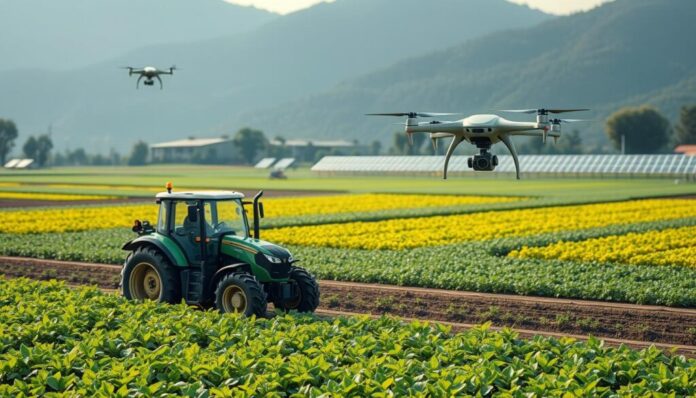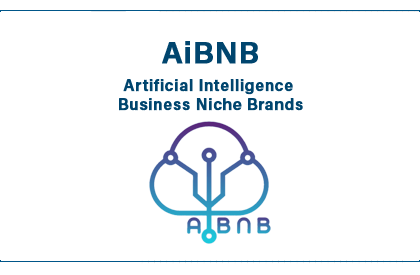Precision farming is revolutionizing agriculture by enabling data-driven decisions. This approach optimizes resources and boosts crop yields. Autonomous farming equipment and drone technology empower farmers to make informed choices, cutting down on waste and enhancing efficiency. The integration of autonomous tractors and harvesters automates tasks, improving accuracy and lowering labor costs.
AI is crucial in transforming agriculture. Drones with AI cameras and sensors offer detailed aerial views. They enable real-time monitoring of crop health, soil conditions, and irrigation needs. This technology supports precision farming, vital for agriculture’s future.
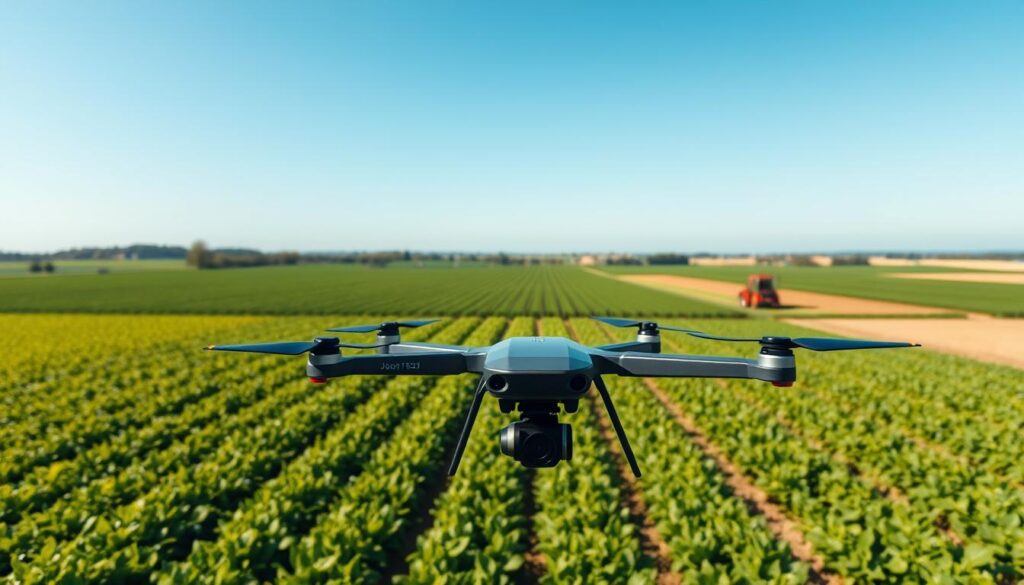
Precision farming, driven by AI and autonomous technology, is agriculture’s future. It allows farmers to boost yields, minimize waste, and optimize resources. The adoption of autonomous farming equipment and drone technology is on the rise, set to grow further.
Introduction to Precision Farming
Precision farming aims to enhance farming efficiency and effectiveness through technology. With autonomous equipment and drones, farmers gather data on their crops. This enables them to make informed decisions, reducing environmental impact while increasing productivity.
Key Takeaways
- Precision farming is transforming the agriculture industry by enabling data-driven decisions.
- Autonomous farming equipment and drone farming technology are key components of precision farming.
- AI in agriculture is playing a crucial role in revolutionizing the industry.
- Precision farming helps farmers to optimize resources and increase crop yields.
- The use of autonomous farming equipment and drone farming technology is becoming increasingly popular.
- Precision farming is helping farmers to reduce their environmental impact while increasing their productivity.
- The future of agriculture depends on the adoption of precision farming practices.
The Evolution of AI in Farming: A Modern Agricultural Revolution
Precision farming is transforming the industry by enabling data-driven decisions. With the aid of ai-powered agriculture tools, farmers can now make informed decisions to enhance their operations. The use of autonomous tractors and harvesters has increased efficiency and reduced labor costs.
The integration of smart farming with ai has revolutionized the way farmers monitor and manage their crops. Drones for crop monitoring have become an essential tool, providing real-time data on crop health, growth, and development. This data is then used to make adjustments to irrigation, fertilization, and pest control, resulting in improved crop yields and reduced waste.
The need for increased efficiency, sustainability, and productivity drives agricultural innovation. By analyzing data from various sources, farmers can identify patterns, predict outcomes, and make informed decisions to enhance their operations. The role of data analytics in modern farming is critical, as it enables farmers to optimize their resources and reduce costs.
Traditional Farming vs. AI-Powered Agriculture
Traditional farming methods are being replaced by ai-powered agriculture, which offers a more efficient and sustainable approach to farming. With the use of autonomous equipment and drones, farmers can now monitor and manage their crops more effectively, resulting in improved crop yields and reduced environmental impact.
Key Drivers of Agricultural Innovation
The key drivers of agricultural innovation include:
- Increased efficiency
- Sustainability
- Productivity
- Reduced costs
The Role of Data Analytics in Modern Farming
Data analytics plays a critical role in modern farming, enabling farmers to optimize their resources and reduce costs. By analyzing data from various sources, farmers can identify patterns, predict outcomes, and make informed decisions to enhance their operations.
Understanding Autonomous Farm Equipment
Agricultural drones and ai in precision agriculture are transforming the farming industry. They introduce autonomous machinery like tractors and harvesters. These machines automate repetitive tasks, boosting efficiency and reducing labor costs. They also enhance accuracy. Farm automation solutions help farmers collect and analyze data better, leading to smarter decisions.
The integration of autonomous equipment into farming practices offers many benefits. Autonomous tractors, for instance, can operate non-stop, cutting down on the need for human labor and boosting productivity. Moreover, ai in precision agriculture allows farmers to optimize crop yields, cut down on waste, and promote sustainable farming.
Some key advantages of autonomous farm equipment include:
- Improved efficiency and productivity
- Reduced labor costs and enhanced accuracy
- Enhanced data collection and analysis capabilities
- Increased crop yields and reduced waste
As agricultural drones and autonomous machinery become more common, farmers will see big improvements in their work. By using ai in precision agriculture and farm automation solutions, the farming industry can become more efficient, sustainable, and productive.
The adoption of autonomous farm equipment is set to revolutionize the farming industry. It enables farmers to make data-driven decisions and optimize their operations for maximum efficiency and productivity.
Drone Technology Revolutionizing Crop Management
Drones, equipped with AI cameras and sensors, offer detailed aerial imagery. They monitor crop health, soil conditions, and irrigation needs. This technology is a cornerstone of smart farming trends. It empowers farmers to make informed decisions, leading to optimized crop yields.
The adoption of drones for precision farming is on the rise. It enables real-time monitoring and analysis of crop health. Through ai-based farm management systems, farmers can comprehensively view their fields. They can identify areas needing attention and make timely adjustments to enhance crop health and yield.
- Improved crop yields
- Reduced water and fertilizer usage
- Enhanced soil health
- Increased efficiency in farming operations
By embracing smart farming trends and utilizing drones for precision farming, farmers can remain at the forefront. They can optimize their farming operations for maximum efficiency and productivity.
| Technology | Benefits |
|---|---|
| Drones | Real-time monitoring, improved crop yields, reduced water and fertilizer usage |
| AI-based farm management | Data-driven decision-making, optimized crop health and yield, enhanced soil health |
AI-Powered Decision Making in Agriculture
Agricultural data analysis is now a cornerstone of modern farming, with ai for pest control playing a key role. It helps farmers optimize their operations, cut down on waste, and adopt sustainable practices. This leads to more efficient and productive farming, thanks to informed decision-making.
Some of the key benefits of ai-powered decision making in agriculture include:
- Improved crop yields through data-driven insights
- Enhanced resource allocation, reducing waste and costs
- More effective pest control, minimizing the use of chemicals and preserving biodiversity
By adopting ai for pest control and agricultural data analysis, farmers can streamline their operations. They also reduce their environmental footprint and improve their bottom line. As the agricultural industry evolves, ai-driven crop management will become even more crucial. It will help farmers stay competitive and sustainable in a rapidly changing world.
As farmers embrace ai-powered decision making, they can expect significant improvements in their operations. They can quickly and accurately analyze vast amounts of data. This allows them to identify areas for improvement, optimize resources, and make more informed decisions.
This, in turn, will lead to more efficient, productive, and sustainable farming practices. It will benefit both the environment and the farmer’s business.
Resource Optimization Through Smart Technology
Precision farming empowers farmers to make data-driven decisions, optimizing resources and boosting crop yields. By embracing sustainable farming with ai, they cut down on waste and foster environmental stewardship. The fusion of machine learning in agriculture and farm robotics has transformed resource management, enhancing efficiency and output.
Smart technology in farming offers significant advantages, including:
- Optimized water management systems, which reduce water waste and promote conservation
- Fertilizer application optimization, which minimizes excess fertilizer use and prevents soil pollution
- Energy efficiency in modern farming, which reduces energy consumption and lowers greenhouse gas emissions
Adopting these smart farming practices allows farmers to reduce their environmental impact while boosting operational efficiency. As the agricultural sector evolves, the importance of sustainable farming with ai, machine learning in agriculture, and farm robotics in optimizing resources and promoting sustainability will grow.
By leveraging smart technology, farmers can forge a more sustainable and efficient food system. This benefits both the environment and the economy.
Environmental Impact and Sustainability Benefits
Precision farming, driven by AI and drones, is transforming the industry. It enables farmers to make data-driven decisions, optimizing resources and boosting crop yields. The use of aerial imagery for agriculture allows for early detection of crop health issues. This reduces the need for harmful chemicals and fertilizers.
The integration of ai in crop health monitoring empowers farmers to make informed choices. This minimizes waste and reduces the environmental impact of farming. Moreover, autonomous farm machinery helps in conserving water and reducing soil erosion. This leads to more sustainable farming practices.
Some of the key environmental benefits of precision farming include:
- Reduced chemical use
- Optimized water consumption
- Improved soil health
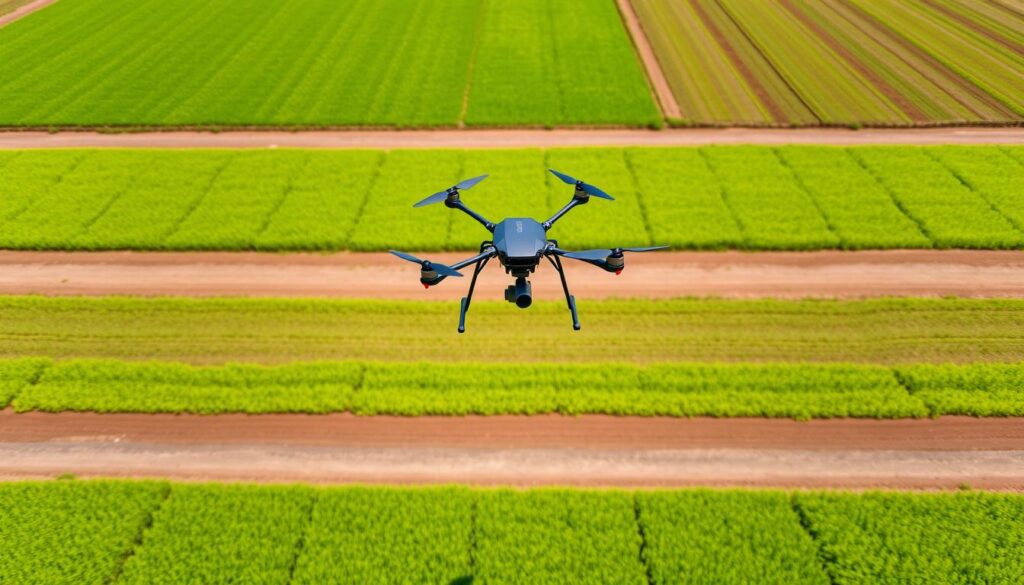
By adopting precision farming, farmers contribute to a more sustainable food system. They reduce their environmental footprint while enhancing crop yields and quality. As the industry evolves, autonomous equipment, drones, and AI will be vital in shaping sustainable agriculture’s future.
| Benefits | Description |
|---|---|
| Reduced chemical use | Minimizes the environmental impact of farming |
| Optimized water consumption | Conserves water resources and reduces waste |
| Improved soil health | Enhances soil fertility and supports biodiversity |
Implementation Challenges and Solutions
Farmers and agricultural businesses face significant hurdles when adopting precision farming technologies. These include the high cost of technology and concerns over data privacy and labor market impacts. These challenges hinder the widespread adoption of agriculture ai solutions and drones for precision farming.
The cost of implementing ai-based farm management systems is a major concern for small and medium-sized farms. However, financing models and government incentives can help mitigate these costs. For instance, some companies offer leasing options or pay-as-you-go models, making these technologies more accessible.
Another challenge is the need for training and technical support. Farmers and farm workers require training to effectively use and maintain these technologies. This can be a significant investment of time and resources. To address this, many companies provide training programs and technical support to help farmers maximize their investments.
Some of the key solutions to these challenges include:
- Financing models and government incentives to reduce costs
- Training programs and technical support to improve adoption and use
- Data protection protocols to address privacy concerns
By understanding and addressing these challenges, farmers and agricultural businesses can more effectively adopt and benefit from precision farming technologies. This includes agriculture ai solutions and drones for precision farming.
The key to successful adoption of these technologies is finding a balance between their benefits and the challenges of implementation. By working together and finding solutions to these challenges, we can unlock the full potential of ai-based farm management. This will create a more sustainable and productive agricultural industry.
| Challenge | Solution |
|---|---|
| High cost of technology | Financing models and government incentives |
| Lack of training and technical support | Training programs and technical support |
| Data privacy concerns | Data protection protocols |
Future Prospects of AI in Agriculture
The world faces a pressing need to feed a growing population. Smart farming trends, including ai for soil analysis and farm automation, offer a crucial solution. These technologies promise to transform agriculture by enhancing crop yields, minimizing waste, and fostering sustainability.
The future of agriculture is bright, with new technologies and trends set to bring about profound changes. Key developments include:
- Increased use of ai for soil analysis to improve crop health and reduce fertilizer usage
- Implementation of farm automation solutions to enhance efficiency and reduce labor costs
- Integration of smart farming trends to promote data-driven decision making
The agricultural industry is set for a major shift towards more sustainable and efficient practices. By adopting ai for soil analysis, farm automation, and smart farming trends, farmers can ensure a food-secure future.
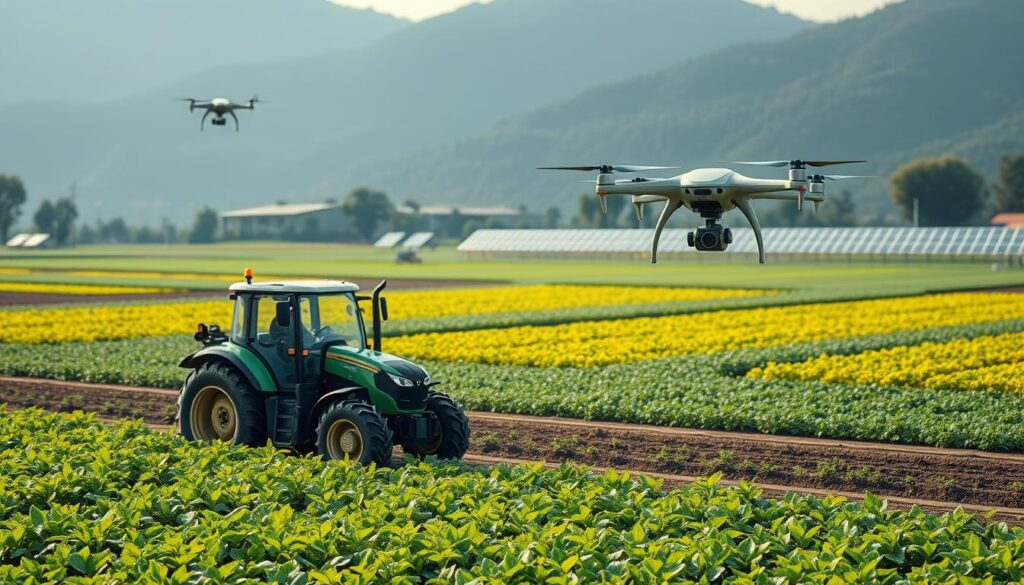
Emerging Technologies and Trends
New technologies, such as precision farming and vertical farming, are being developed to address agricultural challenges. These innovations aim to boost crop yields, lessen environmental impact, and encourage sustainable farming practices.
Predicted Industry Transformations
The agricultural industry is on the verge of a significant transformation. This is driven by the adoption of ai for soil analysis, farm automation, and smart farming trends. As these technologies advance, we can anticipate enhanced efficiency, reduced waste, and increased productivity in agriculture.
Conclusion: Embracing the Future of Smart Farming
The future of agriculture is smart and precision-driven. Precision farming, fueled by AI-driven autonomous farming equipment and drone farming technology, is transforming the sector. It leverages data analytics and advanced tech to improve resource use, boost crop yields, and lower environmental impact.
Looking ahead, the role of AI in agriculture will grow even more significant. Technologies like machine learning, computer vision, and robotics will reshape farming. They promise unprecedented efficiency and sustainability. By adopting these innovations, farmers and agribusinesses can thrive in a fast-changing world. This will help ensure global food security and environmental responsibility.
FAQ
What is precision farming, and how does it differ from traditional farming methods?
Precision farming, also known as precision agriculture, uses AI, drones, and data analytics to manage resources better. It differs from traditional farming, which often follows standard practices. Precision farming is data-driven, allowing farmers to make decisions based on real-time field, crop, and environmental data.
How do autonomous farming equipment and drones contribute to precision farming?
Autonomous farming equipment, like tractors and harvesters, automate tasks, improving efficiency and reducing costs. Drones with AI cameras and sensors provide aerial imagery for monitoring crop health and soil conditions. This data helps farmers make better decisions, leading to more efficient farming and higher yields.
What are the key benefits of integrating AI and smart technology in agriculture?
Integrating AI and smart technology in agriculture brings many benefits. These include better resource management, enhanced crop health monitoring, and increased efficiency. It also reduces environmental impact and promotes sustainable farming. Farmers make better decisions with real-time data insights.
How do drones contribute to precision farming and crop management?
Drones with AI cameras and sensors are key in precision farming. They provide aerial imagery and real-time data. They help with tasks like aerial mapping, identifying crop issues, and optimizing irrigation. This data informs decision-making.
How does AI-powered decision-making benefit agricultural practices?
AI-powered decision-making optimizes farming operations, reduces waste, and promotes sustainability. It analyzes data from equipment and drones to provide insights. This leads to better efficiency, cost savings, and environmental benefits.
What are some of the challenges associated with implementing precision farming technologies?
Implementing precision farming technologies faces several challenges. These include high costs, the need for specialized training, and data security concerns. There are also labor market impacts due to automation. Addressing these through financing, training, and data protection is crucial.
How is the future of AI in agriculture expected to unfold?
The future of AI in agriculture looks promising. Emerging technologies will drive further advancements. Trends include more automation, better soil analysis, and enhanced crop monitoring. AI will also improve supply chain management and focus on sustainability. It promises to enhance food security and sustainability in the agricultural industry.
| Thank you for visiting AIBNB |
precision farming, autonomous farming equipment, AI in agriculture, drone farming technology, AI-powered agriculture tools, autonomous tractors and harvesters, smart farming with AI, drones for crop monitoring, agricultural drones, AI in precision agriculture, farm automation solutions, smart irrigation systems, AI for pest control, agricultural data analysis, AI-driven crop management, sustainable farming with AI, machine learning in agriculture, farm robotics, aerial imagery for agriculture, AI in crop health monitoring, autonomous farm machinery, agriculture AI solutions, drones for precision farming, AI-based farm management, smart farming trends, AI for soil analysis.



